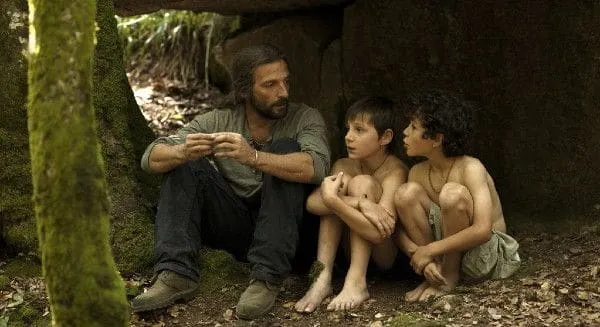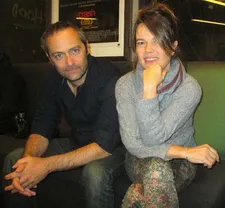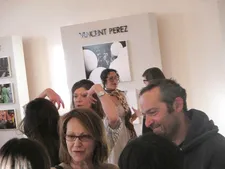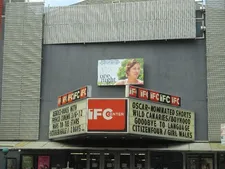 |
| Paco (Mathieu Kassovitz) with Tsali (David Gastou) and Okyesa (Sofiane Neveu): "For me, in the whole first part of the film, the father really is a hero for his sons." |
Wild Life (Vie Sauvage) director Cédric Kahn discusses his role in Axelle Ropert's Miss And The Doctors (Tirez La Langue, Mademoiselle), working with a monkey and Two Days, One Night directors Jean-Pierre Dardenne and Luc Dardenne as co-producers. Wild Life producer Kristina Larsen joins in on our Scandinavian discussion with my references to Nora, from Ibsen's A Doll's House, and Pippi Longstocking. I met up with Kristina and Cédric again at Anne-Dominique Toussaint's Galerie Cinema reception before heading downtown for the First Time Fest closing party honouring Harvey Weinstein.
Anne-Katrin Titze: Let's move on to the monkey.
Cédric Kahn: I hate the monkey!
AKT: You hate the monkey? I don't believe you.
CK: Yes. One day he bit one of the children. The little one [Sofiane Neveu]. That's why he is limping in the film. It wasn't acting!
AKT: There is a moment in Wild Life when the father is packing up his white horse and the capuchin monkey. These are the animals of Pippi Longstocking.
CK: Who is Pippi Longstocking?
 |
| Wild Life producer Kristina Larsen with director Cédric Kahn: "There is no danger with the Dardennes!" Photo: Anne-Katrin Titze |
At this point, Kristina Larsen, producer of Wild Life, joins in to explain who the Scandinavian children's book heroine is. Cédric clearly has never heard of her.
Kristina Larsen: Astrid Lindgren!
AKT: She is this little girl who lives in a big house with her animals, outside society. Her father is a pirate. You should check her out. You did change the names from the real life case in Wild Life. Did you call the mother Nora as a link to Ibsen?
CK: No?
KL: Nora in A Doll's House by Ibsen. Another Scandinavian reference.
Cédric Kahn (laughing): Do you have more Scandinavian questions for me?
AKT: No, I'm done with them. Let's talk about the mother [Nora, played by Céline Sallette] and her belief in miracles in the end.
CK: She is a believer in the end. She was always very mystical before she met him. There's a lot of mysticism in the story about the relationship with nature, the Indian's life, their relation. After that in the pain and the absence of her children, religion became much more important for her. So she went towards God and chose this as a way of getting justice for her sons. So when the children find their mother again, they find somebody who's become a real believer. She speaks of miracles and I think for them it's probably frightening, too.
AKT: And for us. We have not seen her for some time either.
CK: But it's a touching scene?
AKT: It is. And a very unusual one. You make it difficult for an audience to arrive at easy judgement - which is great.
_225.webp) |
| Paco (Mathieu Kassovitz) - "I know how to milk a goat!" |
CK: It's not something that I did deliberately because I think it is very difficult to make a judgement about these people. I think they were carried away by their emotions and their fear of being abandoned by their children and also by the hatred between them.
AKT: Can you talk about your personal connection to the wild life? Earlier you mentioned that you yourself lived in a commune like this for a couple of years when you were a child.
CK: This world that I show in the film, that rather marginal world, is something that I know very well. So I don't look at it with curiosity or as a folkloric thing. I view it much more with empathy. So I don't have a negative judgement about this way of living. Where my judgement is, is in this family's terrible relationship. Sometimes I think that the way of living compensated for the conflicts they had. Because he created an ideal form for the children.
AKT: Can you catch a fish with your hands?
CK: No! It's really hard. But I tried. I know how to milk a goat!
AKT: The sequence in the forest with the bird and the scorpion and all the other animals, is that the high point of the relationship between the father and sons?
CK: For me, in the whole first part of the film, the father really is a hero for his sons. It's amazing, they don't go to school, he has the answers to all their questions. He is omniscient, he is an adventurer, he defied the police. All this heroism helps them forget about their mother and their other brother [half-brother Thomas]. With time, reality regains power over them.
AKT: We are in the mother's family home for a few moments. The camera is mostly on the boys' faces, their reaction to the new environment. We don't get to see the people at first.
 |
| Nathalie Baye and Cédric Kahn at Anne-Dominique Toussaint's Galerie Cinema reception Photo: Anne-Katrin Titze |
CK: By the setting and by the voices you understand what kind of environment you are in. It's normality.
AKT: And the boys make their choice at that moment? To pick their father? Or not?
CK: I think that's the major ambiguity of the film, of the subject. I think that they would choose their life from before. They were born in a trailer with the animals in the countryside and that's what they want to find. And the father convinces himself that it's his choice.
AKT: At last year's Rendez-Vous with French Cinema you were featured as an actor in Axelle Ropert's Tirez La Langue, Mademoiselle. I had a conversation with Axelle and we discussed the character you play, Boris, and one line he has about prostitutes. He says, very calmly, shaming the person he is talking to, "I like prostitutes."
CK: I don't remember that. That was my brother!
AKT: No, you said it. I do see a parallel in the treatment of people at the margins of society there - nonjudgemental, an approach with dignity.
CK: I agree with that in life. I was just not involved in writing the dialogue in the other film.
AKT: Wild Life was co-produced by the Dardennes. How did they get involved?
CK (smiling): That's a question for the producer. They are very rich.
 |
| Rendez-Vous with French Cinema and Two Days, One Night at the IFC Center Photo: Anne-Katrin Titze |
KL: When you choose a producer you might not want them involved on artistic points. But we do love the Dardennes' work. If they agreed to produce, I thought they would have some influence on the movie, but they didn't, because they are very respectful of Cédric's work. They were very delicate. There is no danger with the Dardennes!
AKT: That's a beautiful line "There's no danger with the Dardennes."
KL: We sent them the script, they read it and said they did love the script. For me, it's very good to have co-producers who are also directors.
CK: I was very proud to have their names added to the credits of the film. Because I admire them greatly. I have seen all their films.
AKT: Above the marquee outside, there is a sign for Two Days, One Night.
The Galerie Cinema exhibition is a special event of the 20th Anniversary of Rendez-Vous With French Cinema in New York at the Cultural Services of the French Embassy, 972 Fifth Avenue (79th Street) across from Central Park through April 10.
In part 1, the suspense of Robert Bresson's Pickpocket mixing with Alfred Hitchcock's North By Northwest and turning into a "paranoiac world", the importance of hair and cutting hair as a betrayal, creating a fictional world, wearing pajamas in a forest and imposing your way of life on your children





















